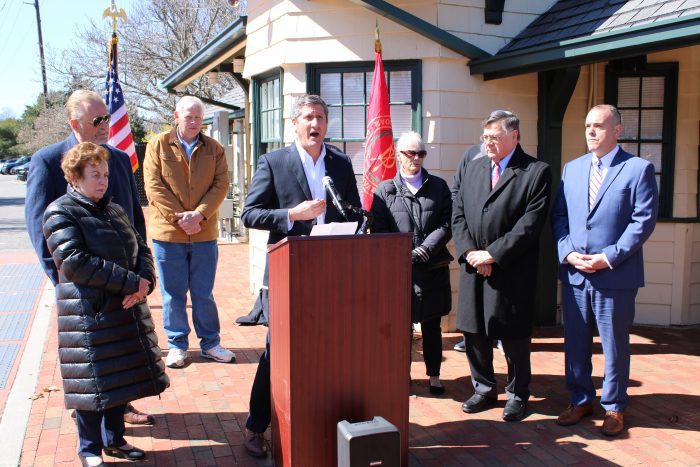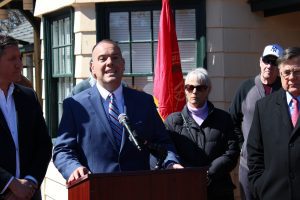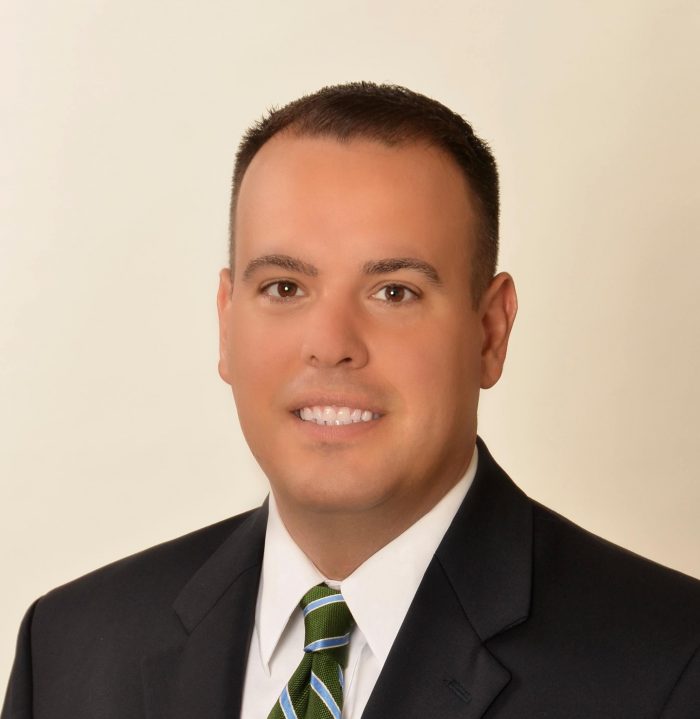On the evening of Wednesday, April 12, the Huntington Town Planning Board approved The Northwind Group’s development proposal at Indian Hills Country Club in Fort Salonga.
Throughout the meeting, a recording of which can be viewed at huntingtonny.gov/meetings, residents can be seen in the background holding up “Vote No” signs in a show of disapproval of the proposal. Signs also read, “Let Us Speak on Indian Hills,” since members of the public were not permitted to speak openly at this meeting.
At the outset, Anthony Aloisio, the town’s director of Planning & Environment, said, “What I would want to do is just point out some of the improvements that we’ve made in the plan since the last plan that you approved was the preliminary plan.”
“In the revised plan we’ve asked for some depressions to be built on the property,” he added. “This was to capture stormwater runoff from the proposed development areas as well as from the golf course.”
Board chairman Paul Ehrlich defended the plan. “We’ve taken a long hard look at every aspect of this plan,” he said. “We’ve allowed the maximum amount of public input by having multiple public hearings, and even extending the comment period for months, well beyond those public hearings.” At this point rumblings could be heard from the crowd.
Ehrlich said in the beginning of the process, the Planning Board passed a resolution directing The Northwind Group and the planning staff to perform “a broad and comprehensive environmental review. ”
According to Ehrlich, at Northwind’s expense the town also brought in outside consultants to review their engineering study.
“As a result of all of this, important aspects of the environmental conditions that currently exist are being significantly improved,” he said. “This application could have easily moved forward without any of these actions.” He also said that the “proposed resolution will ensure that the land of the golf course remains open space in perpetuity.”
Planning Board member Joseph Tantillo said that he has done extensive research on this project. “I would like the record
to note that I feel confident that I can make an objective decision on this plan,”
Tantillo said.
Judge Robert Lifson also said he had done research into this project. “I feel no reason not to participate and vote, and I would vote to approve the project,” he said.
Judge Mara Manin Amendola addressed some of the residents present at the meeting. “I see your signs,” Amendola said. “I understand how the neighbors feel.” She went on to say that “you have to agree it is an improvement” from the original proposal, adding, “Yes, we see you’re not happy, and we’re sorry for that.”
The proposal passed 4-0. The building then erupted in a chorus of boos. Chants of “shame on you” echoed throughout the room for several minutes. This then led to Ehrlich banging the gavel several times with requests for everyone to “clear the room” since the board still had more business to attend to.
As the disturbances continued, Amendola said to a uniformed individual, “Can you make them leave? This is unacceptable.” While the yelling gradually quieted as the room was cleared, Amendola said to other members of the Planning Board: “I do feel bad for them, I do,” and then said, “This is bugging me,” in response to one individual shouting, “Corruption!”
Don McKay, who is running for a Town Board seat, attended the meeting and was not pleased with the way the approval was handled. In a phone interview, he said, “My primary objection is I think the entire application should have been a change of zone application.”
“Why this application did not go to the Town Board for full review and instead went to the Zoning Board of Appeals and the Planning Board, I believe was inappropriate. It should have gone to the Town Board as a change of zone application.”
“The way that this community was treated by the town was reprehensible,” McKay said. “They should have been given a lot more respect, courtesy, and they weren’t. That needs to change.”
“I understand the fact that the developer does have a right to build some residential units on the property if he wants to,” McKay said. “But what he has proposed is too intense, too high of a density for this property.”
John Hayes, president of the Fort Salonga Property Owners Association, which was founded specifically for the project, was also not pleased with how the Planning Board handled the situation.
“It was a so-called public hearing at which the public could not be heard,” Hayes said of the meeting in a phone interview.
“This hearing originally took place in February of 2022, and it was adjourned,” Hayes explained.
“In the meantime, three new plans had been filed by the developer, considerably different in grading, drainage, tree preservation. And we were not allowed to speak on any of this. No public input allowed on it.”
Hayes also said that they are not completely opposed to development at this location, only that the proposed plans go “way too far” and that there have not been any concessions made that he would consider reasonable. “We’ve never ever said no development,” Hayes said. “But we are very passionate about the fact that it should be minimal, and the houses should be placed away from existing residents.”
Hayes went on to explain that some residents that own homes by the golf course would now have several more houses adjacent to their properties. Some of these residents obtained professional appraisals to investigate what the potential effects of these new houses would be, and they were told their property values could decrease by as much as 10%.
In a phone interview, Jim Tsunis, CEO of The Northwind Group, disagreed with this claim. “The homes in the area will actually go up [in value] as a result of this community being built,” he said.
Tsunis, who has been in the real estate business for over 30 years, explained that “being in real estate for as long as I have and building communities in other areas, the homes in the area will benefit from this community being built.”
Tsunis said The Northwind Group has “met every single condition imposed by the Town of Huntington” and has “spent years studying and analyzing the site.” He also said that he has met multiple times with a different group, the Fort Salonga Association, a Fort Salonga-based civic association. “They helped me shape the community and they were able to endorse the community when the plans were completed,” he said.
“The Fort Salonga Association has approved every iteration of the plan since it came into being,” Hayes countered. “We can understand why the Fort Salonga Association was not opposed to the principle of developing on the golf course. What we do not understand is how they could endorse the fact that these houses were right next door to existing properties rather than in the interior of the course.”
Additionally, when asked about the Fort Salonga Property Owners Association, Tsunis said that members have not been in contact for over four years to discuss the proposal to come to some sort of compromise. He indicated he would be more than willing to meet with the organization to discuss the situation.
Hayes said the association had negotiated with Tsunis years ago, adding, “We mutually agreed that we were too far apart. Since then, we haven’t had any contact, but he hasn’t had any contact with us either.” Hayes said that when they talked “there was really no attempt to reduce the number [of houses] that had already agreed on with the town.”
The Fort Salonga Property Owners Association is undergoing the process of filing lawsuits against both the town’s Zoning Board of Appeals and the Planning Board. “This is not a frivolous filing by any means,” Hayes said. “We would not be doing that if we didn’t think we had a very good chance of winning.”





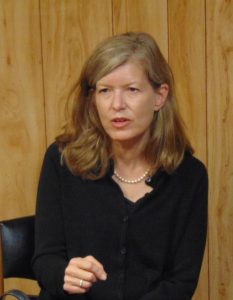
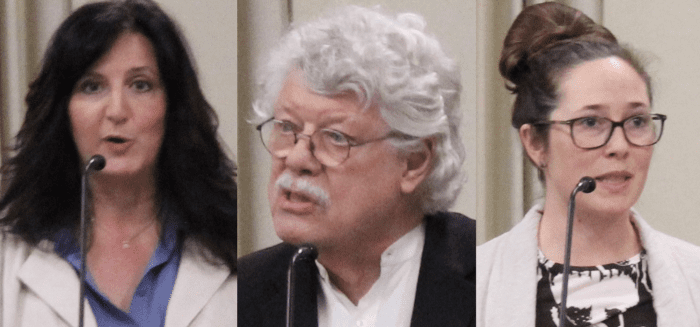


 Bass indicated that the 3rd District is simultaneously grappling with several quality-of-life concerns as the Town Board works to overcome the financial and logistical pitfalls associated with closing the Brookhaven landfill. This facility constitutes roughly half of the town’s public revenue.
Bass indicated that the 3rd District is simultaneously grappling with several quality-of-life concerns as the Town Board works to overcome the financial and logistical pitfalls associated with closing the Brookhaven landfill. This facility constitutes roughly half of the town’s public revenue.
